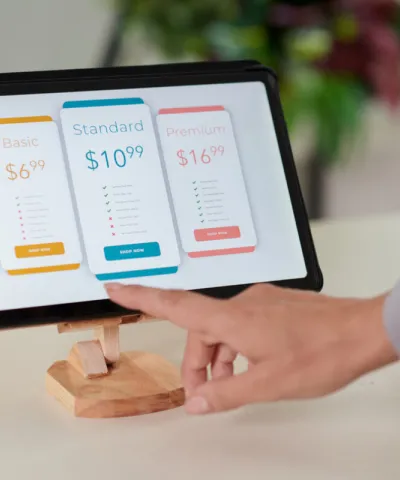Should prices be the same online and in stores? We discuss one of the biggest challenges faced by the retail industry today: price matching
Imagine a customer enters a store with the aim of buying something specific. They find it at what seems an acceptable price and head to the counter.
However, while waiting in line, they pull out their smartphone and run a quick check of your online store. They're surprised to find the same item online with your company but offered at a much cheaper price.
What does the customer do next?
If the item can wait for tomorrow, they might be tempted to save some money. They return the product to the shelf, buy it online, and have it delivered to their front door instead (possibly with an extra delivery fee). If they surpass a certain order value, they might even be able to avoid delivery costs.
But what if the customer urgently needs the product? They have already made their way to the high street, parked their car, waited in line, etc. Leaving the store empty-handed would counteract any savings they could gain.
Most importantly, they need this item now; delivery could take several days. If they felt they were being “ripped off”, they could angrily exit the store and go to a competitor instead.
However, there might be a third option…
Known as price matching, some retailers will “allow” customers to pay the cheaper online price instead. They must ask the cashier and they will lower the store price.
Can customers negotiate prices at a retail store?
Price match guarantees are a common practice among retailers, both in brick-and-mortar stores and online. Major retailers like Home Depot often offer price match policies where they match the price of a product if a customer finds it cheaper elsewhere. This applies to items sold by third-party sellers, open-box items, and even groceries.
Customers can request a price match if they find the same product with the same model number at a lower price within a certain period, typically 14 days from purchase. By matching online pricing, retailers aim to provide the lowest price to customers, whether they shop in-store or online, to maintain competitiveness and customer loyalty.
Thanks to increasing online transparency, what was once an utterly unthinkable scenario for retailers and shoppers has become a daily reality. As a consumer, this sounds great. But what does it mean from a retail business and price image perspective? Is there an obligation to self-match prices, or are stores simply throwing money down the drain?
Do stores have to match their online prices?
Customers don’t have the right to receive the lowest price, but they can do so. We live in a free market economy with free-price selling. So, it all depends on whether the customer is brave enough to ask.
Retailers could argue that price differences are part of their omnichannel pricing strategy. Different customers use different channels, and it makes sense to charge based on willingness to pay. However, retailers are not legally obligated to match their competitors' prices.
Of course, customers don’t think in terms of channel pricing. And the customer is king! They want the best price. They look both offline and online, comparing retailers in the process.
Depending on the size of the price gap, it can be especially confusing to find differences within the same retailer chain. “Omnichannel strategy” is not a satisfactory justification that you can communicate to the customer. It won’t convince them to pay a higher price.
So, how does price matching work for retailers?
Many retailers self-match to avoid angry customers and ensure a clear, fair price image. This is a key metric for all retailers!
A clear price image leads to constant store traffic, directly linked to sales and market share. However, instead of having to compete with the lower price on all channels, setting different prices for different channels means retailers can reach both types of shoppers:
- Undecided customers who start the shopping process in the store
- Decided customers have already researched the product online and have evidence of the online price
Even if some customers in the store receive the lower online price, there will be other products where they are less price-sensitive and don’t pay attention. Yes, the margin for the matched item is lower, but there is still the chance that the customer will spontaneously fill their shopping basket with other impulse buys. Meanwhile, undecided customers pay the “original” price.
Is price-matching good for retailers?
Comparison websites allow customers to compare prices across a wide range of online chains and brands. If a customer requests a cheaper price, it is wise to match it. They are already in the store—your store.
It is better to sell it for a lower price than to send the customer into the arms of your leading competitor. In the digital world, prices are not set in stone. Processes need to be flexible enough to accommodate price-matching.
To sum up, self-matching on prices can be a competitive tool to boost the bottom line. When applied correctly with the right product mix in-store, it can result in great deals for both customers and retailers.
Discounts should be calculated into pricing through a mixed calculation and work best when supported by additional marketing measures to increase basket value.
Still, retailers need to exercise extra caution when price-matching against competitor products. While pricing needs to be attractive to customers, constantly undercutting the competition could lead to massive price erosion.
Of course, the more competitive pricing you apply, the more likely a price war will occur. A price war is never healthy for business.
Many factors surrounding strategy, product roles, target consumers, etc., come into play. Here, it is essential that price-matching decisions are based on expert knowledge of your market and competitive environment. Getting price matching right requires a much more complex discussion and understanding of your market and pricing strategy.
How Simon-Kucher can help
With a decades-spanning legacy, Simon-Kucher has long been synonymous with pricing. We defined the discipline, and it’s ingrained in our DNA.
We take great pride in our scientific, analytical, and data-driven competencies that allow us to impact our clients significantly. Regardless of your business sector, we have the expertise to enhance your pricing, driving sales, profit and satisfied customers.
Our experts are always happy to discuss your issue. Reach out, and we will connect you with a member of our team. Contact us today!





